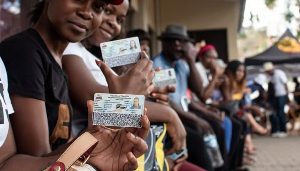 For now, Namibia's political future looks as complex and dynamic as ever
For now, Namibia's political future looks as complex and dynamic as ever
So, Namibia's elections have come and gone, and let’s just say they were full of surprises or maybe not, depending on where you stand. While SWAPO seems to have held its ground, the Independent Patriots for Change (IPC) has had a rough ride. What happened? Why did a party that sparked so much excitement stumble? Let’s break it down.
What’s With the Foreign Influence Drama?
Here’s the thing: people love a good story, and for IPC, the "foreign influence" narrative has been impossible to shake. Critics have pointed to Dr. Panduleni Itula’s time in the UK and his connections to Western organizations, saying it just doesn’t vibe with the whole “Namibian-first” message.
And then there’s the funding. Allegations that IPC tapped into grants from the International University of Management (IUM) to boost its campaign haven’t exactly inspired confidence. Throw in the British High Commissioner showing up at an IPC-hosted gala, and you’ve got voters raising their eyebrows—and their suspicions.
The Opposition’s Big Problem: Teamwork
If you thought the opposition would come together to take on SWAPO, think again. IPC’s coalition with other parties seemed like a good idea at first, but then the cracks started showing. Cue the drama: public blame games, accusations flying back and forth, and a whole lot of finger-pointing.
Take Windhoek, for example. Instead of showing how they could work together, opposition parties fumbled over governance issues, and voters noticed. Nobody wants to back a team that’s too busy fighting to focus on the game.
Free Speech and Fake Love Online
Now, let’s talk about IPC’s reputation. The party took a hit when reports surfaced about threats against critics, with one vocal blogger even going missing. Not a good look for a party promising democracy and transparency.
And then there’s the online mess. An investigation revealed that IPC paid people to hype them up on social media. Think about that for a second—manufactured grassroots support? It’s like pretending you have a party when you’re the only one dancing. Voters caught on, and the trust? Gone.
While IPC struggled, SWAPO stayed solid. Sure, some criticize SWAPO for being too comfortable in power, but you can’t deny their organizational skills.
They’ve got stability, and in uncertain times, stability wins votes. And let’s not forget the big news: Netumbo Nandi-Ndaitwah is likely to become Namibia’s first female president. That’s history in the making, and it’s hard not to applaud.
What IPC Needs to Do Next
So, where does IPC go from here? Honestly, they’ve got a lot of work to do. First, they need to clean up their act no more foreign influence rumors, no more social media stunts, and no more infighting. Voters want a party that’s united and focused on the issues that matter.
Second, they need to rebuild trust. That means being transparent about funding, respecting criticism, and showing that they’re here for Namibia—not for anyone else. It’s a tall order.
THE BIGGER PICTURE
Here’s the thing: whether you’re Team SWAPO, Team IPC, or somewhere in between, these elections showed that Namibia’s democracy is alive and kicking and SWAPO’s dominance isn’t going anywhere.
For now, Namibia’s political future looks as complex and dynamic as ever. And as voters, we’ve got the power to shape it. Here’s hoping all parties SWAPO, IPC, and everyone else step up their game. Because at the end of the day, we all want the same thing: a Namibia that works for everyone.